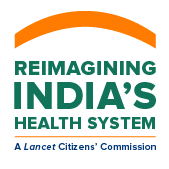
Home/ International Universal Health Coverage Day (UHC Day)
International Universal Health Coverage Day (UHC Day)
The Lancet Citizens’ Commission on Reimagining India’s Health Systems Calls for Urgent Action to Achieve - Healthcare for All Must be Built on the Voices of All
12 December 2021 – This day is celebrated as Universal Health Coverage Day, marking the anniversary of the United Nations’ historic and unanimous endorsement of a resolution urging countries to accelerate progress toward Universal Health Coverage (UHC) in 2012, signifying a global commitment to achieving ‘Health for All’ by 2030. The Lancet Citizens’ Commission on Reimagining India’s Health System advocates the idea that a structural change in the Indian health system will be needed to realize UHC, which is even more evident in the shadow of the pandemic. Our belief is that such a structural change must be guided not only by the perspectives of policymakers and public health experts but, as importantly, through a consultative and participatory engagement with the diverse sectors involved in health care. The latter includes both the actors in the health care system (such as the doctors and nurses) and the beneficiaries (i.e., India’s citizenry). Such consultations must embrace the immense diversities and disparities which characterize the country and its health care system. These consultations will be conducted using diverse methods, including district case studies, workshops, and a nationally representative citizen survey. Building on this evidence and its dissemination through a series of events and publications (www.citizenshealth.in), the Commission will publish a citizens’ roadmap towards a health system that offers comprehensive, accountable, accessible, inclusive, and affordable quality healthcare to all citizens.
Highlighting the road to achieving UHC in India, Gagandeep Kang, Professor, Christian Medical College, Vellore, said, “Delivering on universal health coverage in India requires urgent and concerted action to building a trusted, accessible spectrum of services to all of society. From skilled, caring, committed human resources to enabling technologies and governance systems that empower, facilitate, and evaluate the delivery of healthcare to all citizens, we need changes in systems and structures to move towards UHC. We know this can be done, and we need to work together across sectors to do it.”
“The Covid19 pandemic has unleashed the power of technology to digitise data capture of vaccination, diagnosis, treatment, and outcome. We have the opportunity to leverage the various digital platforms beyond Covid and apply it to advanced healthcare management that delivers access and affordability across the public and private ecosystem,” said Kiran Mazumdar-Shaw, Executive Chairperson of Biocon.
Tarun Khanna, Jorge Paulo Lemann Professor at Harvard Business School and Director of The Lakshmi Mittal and Family South Asia Institute, commented on the critical role of healthcare for India’s wider ambitions. “The payoff to institutional change in the healthcare system is massive, but there is no shortcut to Universal Healthcare. We must engage in the cross-sector dialogue within India to identify sensible paths and also to gain the buy-in of diverse constituents,” he said.
“As the world enters the third year of the COVID-19 pandemic, all countries have realized the need for health systems that are universal, responsive, equitable, evidence-informed, and resilient. The active engagement of citizens is critical to realizing this goal,” said Vikram Patel, Pershing Square Professor of Global Health, Harvard Medical School; Professor, Harvard TH Chan School of Public Health; Co-founder, Sangath.
The Lancet Citizens’ Commission on Reimagining India’s Health System is a cross-sectoral endeavor to develop a citizens’ roadmap to achieving universal health coverage for the people of India in the next decade. For more information on the Lancet Citizens’ Commission, please visit www.citizenshealth.in
Media Contact (please email requests for information or interviews):
Pooja Gupta (pooja_gupta@harvard.edu)
